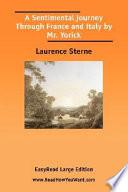Quotes from book
A Sentimental Journey Through France and Italy

A Sentimental Journey Through France and Italy is a novel by Laurence Sterne, written and first published in 1768, as Sterne was facing death. In 1765, Sterne travelled through France and Italy as far south as Naples, and after returning determined to describe his travels from a sentimental point of view. The novel can be seen as an epilogue to the possibly unfinished work The Life and Opinions of Tristram Shandy, Gentleman, and also as an answer to Tobias Smollett's decidedly unsentimental Travels Through France and Italy. Sterne had met Smollett during his travels in Europe, and strongly objected to his spleen, acerbity and quarrelsomeness. He modeled the character of Smelfungus on him.The novel was extremely popular and influential and helped establish travel writing as the dominant genre of the second half of the 18th century. Unlike prior travel accounts which stressed classical learning and objective non-personal points of view, A Sentimental Journey emphasized the subjective discussions of personal taste and sentiments, of manners and morals over classical learning. Throughout the 1770s female travel writers began publishing significant numbers of sentimental travel accounts. Sentiment also became a favorite style among those expressing non-mainstream views, including political radicalism.

“God tempers the wind, said Maria, to the shorn lamb.”
Maria. Compare: "Dieu mésure le froid à la brebis tondue" (translated: "God measures the cold to the shorn lamb"), Henri Estienne (1594), Prémices, etc, p. 47; "To a close-shorn sheep God gives wind by measure", George Herbert, Jacula Prudentum.
A Sentimental Journey Through France and Italy (1768)

“Hail, ye small, sweet courtesies of life! for smooth do ye make the road of it.”
The Pulse, Paris.
A Sentimental Journey Through France and Italy (1768)

“I pity the man who can travel from Dan to Beersheba and cry, 'Tis all barren!”
In the Street, Calais.
A Sentimental Journey Through France and Italy (1768)

“They order, said I, this matter better in France.”
Source: A Sentimental Journey Through France and Italy (1768), Line 1.

“A man who laughs will never be dangerous.”
The Passport, Versailles.
Original: (fr) Un homme qui rit, said the duke, ne sera jamais dangereux.
Source: A Sentimental Journey Through France and Italy (1768)

“I was at peace with the world before, and this finish’d the treaty with myself.”
Calais.
A Sentimental Journey Through France and Italy (1768)